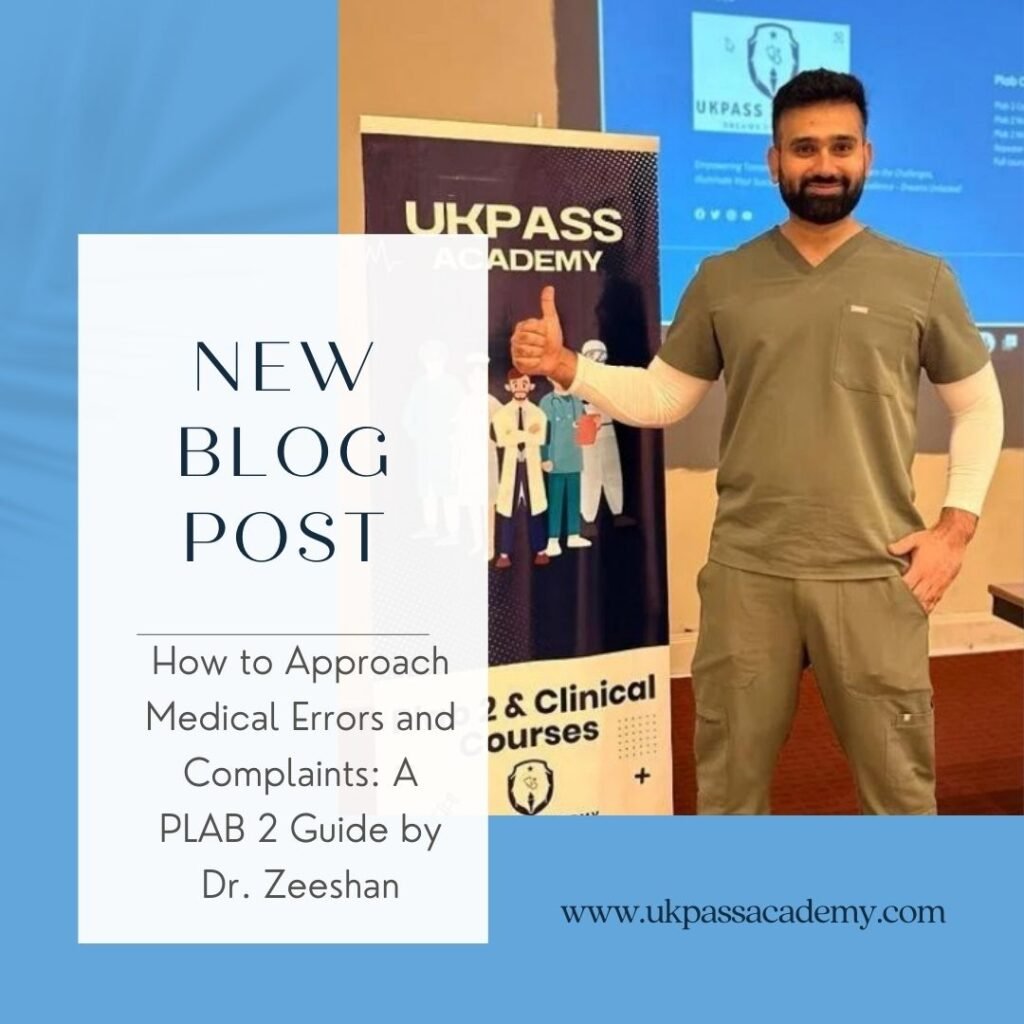Navigating medical errors and patient complaints is an essential skill for any doctor, especially those preparing for the PLAB 2 exam. Understanding how to handle these situations effectively can make a significant difference in patient care and professional development. In this blog post, Dr. Zeeshan from UKPASS Academy will delve into key principles and strategies to approach medical errors and complaints during the PLAB 2 exam.
Key Principles to Remember
When faced with a medical error or an angry patient, it’s crucial to adhere to certain principles that can help mitigate the situation and uphold professional standards:
1. Remain Calm and Apologetic
- Avoid Escalation: Ensure you remain composed and avoid becoming defensive or confrontational.
- Apologize: Express genuine remorse for any inconvenience or distress caused to the patient. Acknowledging the issue is a critical first step.
- Take Responsibility Professionally: While apologizing, clarify that you are expressing empathy rather than admitting personal guilt.
2. Communicate Effectively
- Clear Explanation: Provide a clear and honest explanation of what went wrong and what steps are being taken to rectify the situation.
- Invite Questions: Encourage the patient to ask questions and address their concerns patiently.
- Document Discussions: Document the conversation and any assurances given to the patient for future reference.
3. Learn and Improve
- Reflect on the Incident: Use the experience as a learning opportunity to prevent similar errors in the future.
- Professional Growth: Emphasize your commitment to continuous improvement and patient safety.
Scenario Analysis: Handling a Delayed Lab Result
Let’s examine a typical scenario often encountered in medical practice and exams like PLAB 2:
Scenario: You’re working in a trauma unit. Mr. Keane, aged 40, underwent a pre-op assessment where you collected blood samples. Due to a labeling error, his sample was misplaced, requiring him to undergo another blood test.
Approach:
- Acknowledgment and Apology:
- Start by apologizing sincerely to Mr. Keane for the inconvenience caused.
- Express empathy for his frustration and inconvenience.
- Explanation and Reassurance:
- Clearly explain what led to the error and the steps being taken to ensure it doesn’t recur.
- Reassure Mr. Keane that the delay won’t impact his surgery schedule.
- Offer Solutions:
- Discuss alternative times for the blood test that accommodate his schedule.
- Offer to involve a consultant if needed to address any further concerns Mr. Keane may have.
- Closure and Follow-up:
- Thank Mr. Keane for his understanding and patience.
- Document the discussion and any agreed-upon actions in his medical records.
Conclusion
Handling medical errors and patient complaints requires a blend of empathy, professionalism, and effective communication skills. For PLAB 2 candidates, mastering these aspects is not only essential for passing the exam but also for delivering excellent patient care throughout their careers. By adhering to the principles discussed—remaining calm, apologizing sincerely, communicating clearly, and learning from each experience—candidates can navigate challenging situations with confidence and integrity.
Remember, the ability to handle medical errors and complaints gracefully is a hallmark of a competent physician. As you prepare for the PLAB 2 exam, practice these strategies to ensure you’re well-equipped to handle any scenario that comes your way.
Best of luck in your PLAB 2 journey and beyond!

